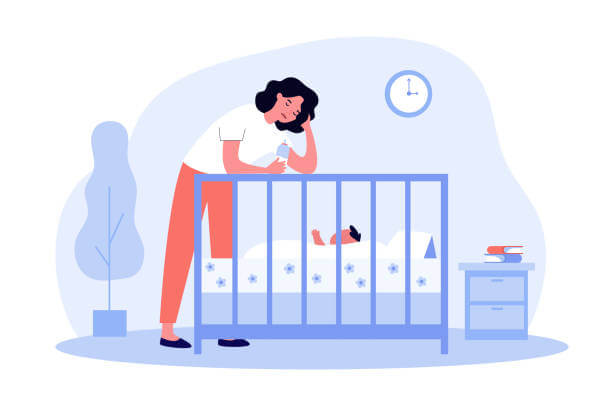psychological problems and anxiety, especially if it is a hurtful word, and it will have a negative impact on your life, and neglecting your feelings is completely mistaken and can lead to suicide. We are here for you. Don't put yourself through unnecessary stress. Consult an online psychologist at Esaal to learn how to deal with stress and not let it ruin your life.Use EmployeeWellness50 to get 50% off for all usershttps://bit.ly/3hVQc96 Read More

Postpartum depression affects approximately 15% of women. A woman experiences frequent crying, emotional highs and lows, fatigue, guilt and anxiety, and may have difficulty caring for her baby.
It's normal to feel anxious or suspicious, especially if you're a first-time mom, but if your feelings include loneliness with severe mood swings and frequent crying spells, you may have postpartum depression.
Do not hesitate now to consult the best psychologist via the Ask website, regarding postpartum depression, by booking an online session at an affordable price, with multiple payment options that suit everyone.
First, the causes of postpartum depression
Physical and emotional problems may play a role in postpartum depression, including:
1- Emotional problems. When you are worried about the responsibility of taking care of a child, or sleep deprived and exhausted, you feel that you have lost control of your life; You become unable to deal with minor problems.
2-Physical changes after childbirth, as progesterone and estrogen in your body decrease dramatically, and other hormones produced by the thyroid gland decrease; Which makes you feel tired and depressed.
Second: Symptoms of postpartum depression
1- Depressed mood in most paragraphs of the day.
2- Feelings of anxiety, guilt, despair, fear, panic, or worthlessness.
3- Loss of interest or enjoyment of most activities on a daily basis.
4- Recurrent thoughts of death or suicide.
5- Sleep problems.
6- Appetite changes.
7- Decreased sexual desire.
8- Not caring for your child or feeling unrelated to him.
9- Difficulty concentrating or making decisions.
Third: Methods of treating postpartum depression
If you have symptoms of postpartum depression, you should contact your health care professional as soon as possible, to begin treatment.
Treatment can include; Certain medications from treatment and support groups.
1- Medicines
Antidepressants are among the most common medications. For the treatment of postpartum depression, as it helps relieve its symptoms, but it takes time, starting from 6-8 weeks.
These medications are given by a health care professional, and some cause side effects such as anxiety and irritability, digestive problems, headaches, and other symptoms.
Women who are breast-feeding have specific drug and treatment options. Your doctor can help you choose a safe option while breastfeeding.
2- Psychotherapy
Studies have shown that CBT significantly improves symptoms of postpartum depression.
This treatment includes; Learn and use strategies to change your thinking, recognize distortions, use problem-solving skills to deal with difficult situations, and develop greater confidence in your abilities.
3- Natural Remedies
home practices such as engaging regularly in light exercise, eating a healthy diet, practicing meditation or yoga, and spending time in nature; They may help you feel better, especially when used along with medications and psychotherapy.
4- Self-care
Postpartum depression can leave you feeling isolated and exhausted, so it's important to make time for yourself, your family and friends, and be able to seek help when you need it.
You can now seek medical advice from the best psychotherapists; Regarding postpartum depression, by booking an online session at an affordable price and in complete confidentiality, click here to book the session.




